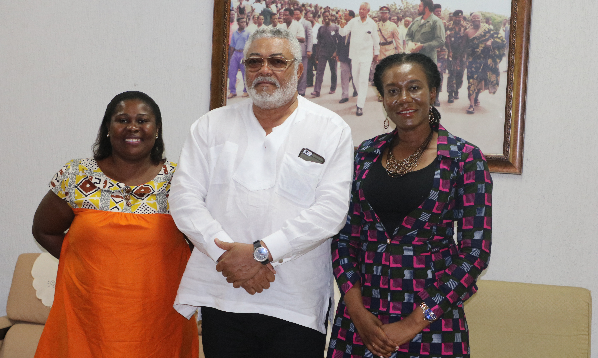
High population growth source of instability - Rawlings
Former President Jerry John Rawlings has described the increasing population growth rate of the country as a source of threat to the country’s stability.
According to him, the high population growth rate will be a serious source of instability in the country if necessary actions are not taken to deal with the situation.
“It will be a serious source of tension permanently in this society,” he said.
Courtesy call
Mr Rawlings gave the warning when the Executive Director of the National Population Council, Dr Leticia Adelaide Appiah paid a courtesy call on him at his office in Accra on Wednesday, May 9, 2018.
The call was to brief the former president about the effects of the soaring population and reproductive health issues in Ghana and solutions.
Statistics
According to the Ghana Population Council, the standard Replacement Level Fertility rate (which is the total fertility rate — the average number of children born per woman—at which a population replaces itself from one generation to the next, without migration) is 2.1 but out of the total fertility rate of 4.2 for Ghana as compared to the global population growth rate of 2.5 which is important for economic development.
Ghana adopted a comprehensive population policy in 1969 with the aim to synchronize population management and economic development.
The 1969 population policy under the theme “Population Planning for National Progress and Prosperity”, which was last reviewed in 1994 was aimed at reducing the country's high expected population growth rate which in 1960-1970 was 2.4 per annum with a target of 1.7 by 2000.
Family planning
Mr Rawlings said the increasing population growth “is as a result of certain weakness” that must be addressed.
He added that lack of discipline and sense of responsibility are part of the factors contributing to the high population growth rate.
The former president said there was the urgent need to critically look at the country’s population growth rate.
He said when parents have large family sizes, it would be difficult for them to feed, noting that “if parents give birth to many children, it will be difficult for them to feed”.
Mr Rawlings said he is personally passionate about the country’s population issues because a manageable population would grantee a better standard of living.
He has therefore called on religious leaders and media practitioners to help to raise awareness about the country’s soaring population growth rate.
Dr Leticia Adelaide Appiah said one of the key solutions to the increasing population growth rate was to encourage people to go for family planning.
She said the high poverty rate in most of the developing countries was as a result of the high population growth rate.
She said most of the advanced countries have taken measures to control their population, hence the need for other developing countries including Ghana to follow suit.
Dr Appiah was of the view that the same attention given to immunization should be given to family planning issues.
Teenage pregnancies
She said many Ghanaian teenagers are getting pregnant particularly along the coastal communities, explaining that 30 per cent of women who are delivered of babies in the country are teenagers.
Dr Appiah said almost a quarter of children in the Volta Region get pregnant during their teens, adding that Volta and Central Regions have teenage pregnancy rates of 22 and 21 per cent respectively.
“The teenage pregnancy in the developed world is less than 2 per cent,” she said, adding “Our teenage pregnancy rate is 14 per cent nationwide”.
